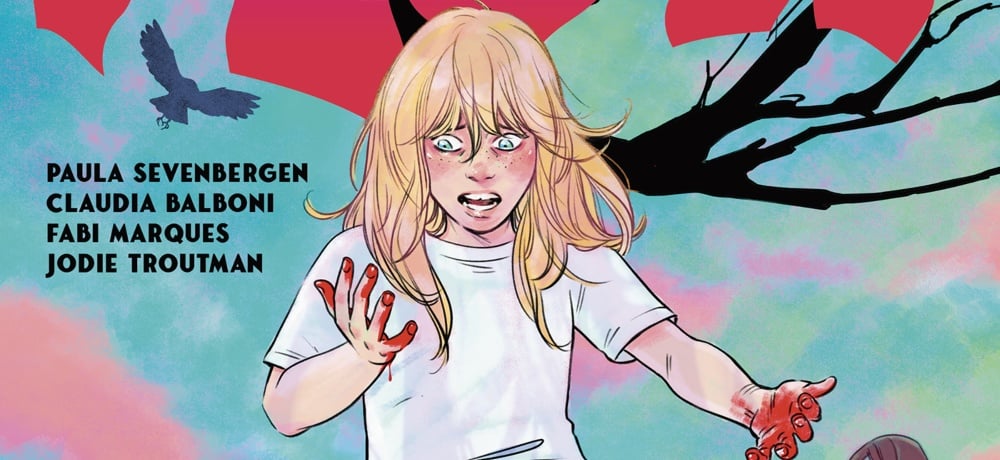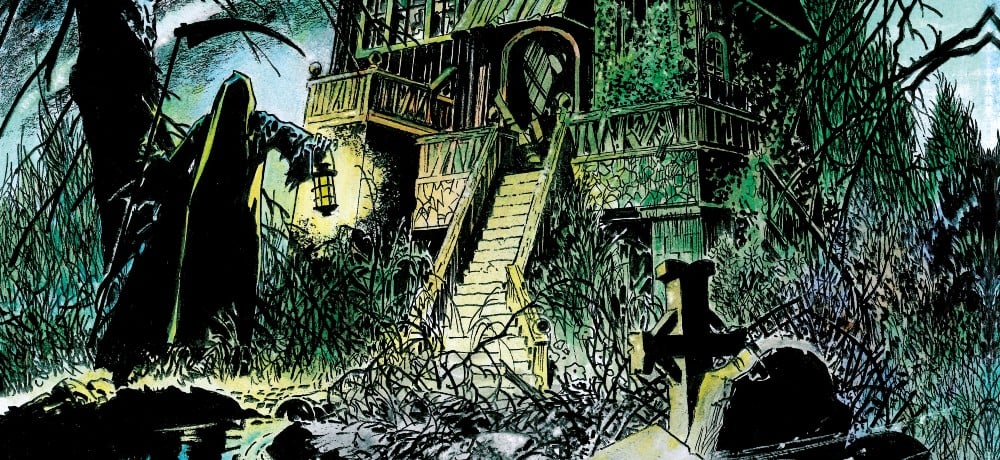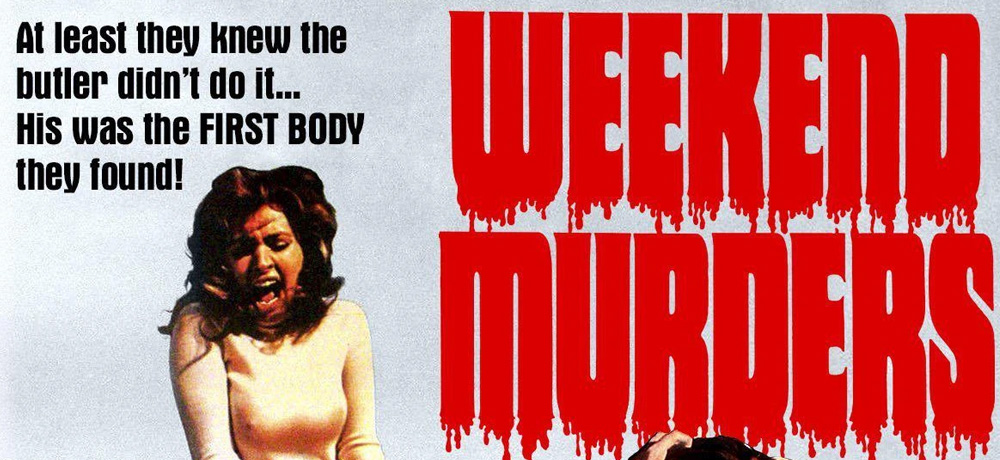






[This October is "Gialloween" on Daily Dead, as we celebrate the Halloween season by diving into the macabre mysteries, creepy kills, and eccentric characters found in some of our favorite giallo films! Keep checking back on Daily Dead this month for more retrospectives on classic, cult, and altogether unforgettable gialli, and visit our online hub to catch up on all of our Gialloween special features!]
Clue and Knives Out. Those were the two movies that immediately came to mind after my first viewing of Michele Lupo’s The Weekend Murders, aka Concerto per pistola solista. The film’s zany, anything-goes murder mystery reminded me of the former, while the comedic family strife reminded me of the latter, not to mention that the film revolves around a group of people staying at the same mansion where the rooms seem almost as endless as the rising body count.
To be honest, these similarities were as much a surprise to me as the untimely ends of the slain victims in The Weekend Murders. My previous experiences with gialli have been more somber and bleak viewings. Don’t get me wrong, I’ve enjoyed the gialli that I have seen, and find them to be enthralling in their execution and engrossing in their storytelling, but I’ve never seen one that so brazenly welcomed humor with open arms over all other elements. To put it frankly, I never knew a giallo could be so funny… and so much damn fun.
Then along came The Weekend Murders to put me in my place. The setup is a timeless one when it comes to murder mysteries: the patriarch of a wealthy family (in this case the second baron of Vale) has passed away, and the surviving members of the brood have gathered to his estate to hear the reading of the will. Descending upon the countryside manor like a flock of vultures rather than mourners, the assorted bunch all come with their own baggage—more of which is in their minds rather than the trunks of their cars. Some, like in-law Anthony (Peter Baldwin), still feel the sting of not being accepted into the family by the deceased, while others like Barbara (Anna Moffo) feel a sense of entitlement for being closer to the baron when he passed than the ones who long ago fled the coop. And still others, like Cousin Georgie (Christopher Chittell) and his overbearing mother, aunt Gladys (Marisa Fabbri), seem to be stark raving mad on a level all their own.
It’s a delightful hodgepodge of total family dysfunction, and seeing these eclectic characters come together for a reading of a will makes me wish that we had a Christmas movie starring this frenetic family, as their increasingly chaotic clashes are reminiscent of the shenanigans that take place at Clark Griswold’s house. This family doesn’t just get on each other’s nerves, they tear them apart with a chainsaw and throw them into the woodchipper for good measure. As it turns out, that violence isn’t just metaphorical, as at least someone in the family is capable of killing. After Barbara is given the sole inheritance of the mansion, much to the chagrin of everyone else in the room other than local police sergeant Thorpe (Gastone Moschin), who’s just happy to be left with the baron’s azaleas, the bodies begin piling up, with the estate’s housekeeping staff also pulled into the orbit of this deadly family reunion.
As the body count grows, the comedy only gets better, but it never feels out of place. Most of the family and the estate’s staff hate each other to death anyway, so they’re not particularly perturbed by the actual killing of one of their own. Why should that get in the way of their latest insults and infidelity? Lupo and the film’s trio of screenwriters (Sergio Donati, Massimo Felisatti, and Fabio Pittorru) wisely never let things get too dark, leaning into the increasingly ludicrous familial contempt and sprinkling in morbid fake-out pranks from Georgie, who is dealing with some major Norman Bates-level mommy issues.
Adding significantly to the film’s humor is Thorpe, who hangs around the estate on his bicycle and assists Scotland Yard’s Inspector Grey (Lance Percival) with the growing list of murders. You know how at a certain point you realize that Daniel Craig is stealing the show in Knives Out and Tim Curry might be the main star of Clue (or maybe those are my own delusions)? Well, Moschin pulls the same power move in The Weekend Murders. While Thrope at first seems like a bumbling policeman who exists strictly for some offbeat laughs (I’m looking at you, deputies Ross and Farrah from Halloween 5), he eventually turns into the driving force of this story, as it turns out Thorpe is actually quite brilliant with his deductions and has a keen eye that doesn’t overlook even the smallest details at crime scenes. Moschin still brings a great physical comedy to the role, running into people and always seeming to be at the wrong place at the wrong time, but that doesn’t stop him from narrowing down his suspect list with a methodical efficiency and fierce desire for justice. Like several fake-out deaths throughout the film, Thorpe is a wonderful, funny surprise and not someone I expected to find in a giallo (at least to this extent).
Comedy aside, the stakes—just like in Clue and Knives Out—are still very real and very high in The Weekend Murders. There are plenty of moments of genuine fear to be found in between the humor, with the gloomy countryside estate lending a foreboding gothic feel to the proceedings (and just what exactly is going on in that astronomy tower where the baron spent all of his time before his death?). Even with Scotland Yard on the case, no one ever feels safe in this sprawling abode, and it’s almost expected that each new dawn will bring about the discovery of a new dead body. Lupo and cinematographer Guglielmo Mancori expertly capture the loneliness and sleepiness of the estate’s isolation, which makes their intense zoom-ins and quick cuts between the family members that much more shocking when a new body is found or revelation is brought to life (if you watch Saturday Night Live, these abrupt close-ups might remind you of The Californians sketch they used to do). Accompanying this frenetic camerawork are ear-splitting gunshots that Francesco De Masi splices into his score, an effective reminder that as funny as this family and their story can be, the creators are still taking the tension and the stakes seriously. In the case of The Weekend Murders, death is no laughing matter, even if there are hijinks galore in between the bodies hitting the floor.
I thought I knew what to expect from gialli, but The Weekend Murders proved me wrong. I’ve always appreciated how innovative and expansive the giallo genre can be, but I still had no idea it could be so funny without sacrificing its scares and its characters’ integrity. But then again, that’s why I love taking part in our retrospective series on Daily Dead. I always learn something new, and I encourage you to seek this one out if you haven’t. It deserves to be on that same treasured shelf as films like Clue and Knives Out, especially since it was released 15 years before the former and nearly 50 years before the latter. I guess murder mysteries—giallo or otherwise—really are timeless… and so are dysfunctional families.
---------
Keep an eye on our online hub throughout October for more of our Gialloween retrospectives!